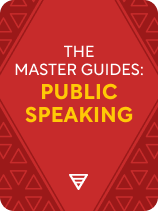

This article is an excerpt from the Shortform book guide to "The Master Guides: Public Speaking" by Shortform. Shortform has the world's best summaries and analyses of books you should be reading.
Like this article? Sign up for a free trial here.
What are the best ways to practice public speaking? What should you do if you feel anxious about an upcoming speech?
To practice public speaking, you should rehearse your talking speed, your body language, and your hand gestures. Running through your speech in private with these things in mind will improve your presentation when you give your speech in public.
Read more about how to practice public speaking so that your nerves don’t get the best of you in front of an audience.
How to Practice Your Speech
Once you’ve written your speech, you’ll need to think about how to practice public speaking so you can deliver your ideas clearly and confidently. In Public Speaking for Success, Dale Carnegie recommends you memorize your speech. This doesn’t necessarily mean learning each exact word and phrase by heart, but instead thoroughly learning your argument so you can speak extemporaneously. This will not only save you time but will also enhance your delivery—when you know your speech well enough, you can deliver it with conviction, feeling, and authenticity.
Carmine Gallo suggests you focus on three things when practicing your speech:
- The speed at which you talk. Keep rehearsing until you’ve perfected talking at a speed of 190 words per minute. This is a conversational rate of speech that seems natural.
- Confident body language. Examples of confident body language include standing up straight, holding your head high, and making frequent eye contact with your audience. If you fail to appear confident in what you’re saying, your audience will trust you and your opinions less.
- Hand gestures. Use gestures to add emphasis to what you’re saying. For example, if you’re talking about how much a problem has grown in size, create a small circle with your hands and expand it. Studies have shown that making hand gestures will increase the audience’s confidence in you and what you’re saying.
Manage Stress and Anxiety About Public Speaking
It’s normal to feel nervous and release adrenaline before your speech, even if you’re a seasoned speaker. In TED Talks, Chris Anderson explains that adrenaline can be good: It gives you energy and animates your voice. However, in large doses, it can also make you shaky, give you dry mouth, and cause anxiety. He gives some tips for managing your nerves:
Tip 1: Get active. If your adrenaline is high enough to make you shaky, do something physical to get rid of the excess. Carnegie suggests you jump around and shake your fists in the air—feel your convictions and allow them to animate you and fire you up.
Tip 2: Drink five to six ounces of water five minutes before you speak. This is enough to keep dry mouth at bay but not enough to fill your bladder.
Tip 3: Focus on your breathing. Make sure the oxygen is going all the way down into your stomach and hold it for a moment or two before exhaling. In Amplify Your Influence, keynote speaker René Rodriguez suggests another breathing variation for calming your nerves: box breathing. Breathe in for four counts and pause for four counts. Then, breathe out for four counts and pause again for four counts. Repeat this cycle of breath for as long as you need to feel more centered and calm.
If all else fails (if, for example, you begin stuttering or your mind goes blank), Anderson says to simply tell the audience you’re nervous. They want to root for you, and admitting that you’re experiencing nerves only makes you more relatable. However, Maxwell disagrees, arguing that if you show that you’re nervous in any way, your audience will be more concerned about you than your message. He recommends that you combat your nerves by adopting a mantra—a short affirming statement to remind yourself that you’re able to communicate well and make a difference with your words.

———End of Preview———
Like what you just read? Read the rest of the world's best book summary and analysis of Shortform's "The Master Guides: Public Speaking" at Shortform.
Here's what you'll find in our full The Master Guides: Public Speaking summary:
- How you can master public speaking—even if you fear it more than death
- Insights from leading experts on how to prepare and deliver a speech
- How to keep your audience's attention and stop them from losing focus






